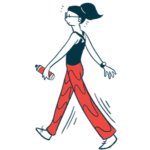Stress in MS linked to worse disability, more burden in US survey
Referrals for support urged to help enhance MS patients' well-being
Written by |

Being exposed to stress as children or adults makes it more likely that people with multiple sclerosis (MS) will experience more disability and/or a heavier burden from relapses, according to a new survey study of more than 700 people in the U.S.
“MS is the leading cause of non-traumatic disability among young adults, and additional research is needed to identify these external drivers of disability that can be addressed or prevented, including stress, to improve functional outcomes,” Tiffany Braley, MD, one of the study’s researchers and the director of the division of MS and neuroimmunology at University of Michigan Health, said in a press release.
“This knowledge is needed to inform MS research as well as clinical care,” said Braley, also the director of the Multidisciplinary MS Fatigue and Sleep Clinic. Her team noted that research efforts on the link between MS and stress “that don’t account for the full lifespan … could miss vital information,” and stressed that action is needed to deal with disability triggers.
“Referrals to resources, such as mental health or substance use support could help reduce the impact of stress and enhance wellbeing,” Braley added.
The study, “Associations among stressors across the lifespan, disability, and relapses in adults with multiple sclerosis,” was published in the journal Brain and Behavior.
Investigating stress as a trigger for MS relapses
MS is an autoimmune neurodegenerative disorder characterized by a variety of symptoms, ranging from problems with vision and difficulties with balance or coordination to numbness or tingling in different parts of the body and trouble walking.
Many people with MS experience flare-ups, known as relapses, which are times when symptoms become worse or new ones appear. Relapses are usually followed by remissions, or periods in which symptoms become milder or go away.
What exactly sets off these relapses is unknown, but it is believed that exposure to stress may act as a trigger.
Now, a team of researchers at the University of Michigan sought to understand how exposure to varying types of stress at different times in a person’s life could impact disability severity and relapse burden.
The researchers sent out a survey to the National MS Society’s electronic mailing list in October 2021. The survey asked how often patients had been exposed to stressors, and how severe the exposure was. Stressors were measured using the Stress and Adversity Inventory, known as STRAIN, which captured the cumulative count and severity of 55 stressors over a person’s lifespan. STRAIN uses a 1-5 scale, in which higher scores reflect greater stress.
“Examples [of stressors] include physical/sexual abuse, neglect, poverty, divorce, neighborhood violence, and witnessing domestic abuse,” the researchers wrote. Stressors that occurred before age 18 were classified as childhood stressors.
Stress in childhood may impact patients throughout life
Due to the potential of COVID-19 stress confounding relapse rates, the team also investigated how burden associated with relapses had changed since the COVID-19 pandemic started. Participants could report more or less pain, fatigue, disability, frequency, and length of relapses.
Disability severity was measured using the Patient Determined Disease Steps (PDDS) scale, and was classified as mild, moderate, or severe.
A total of 713 people, with a mean age of 49, responded to the survey. Most were women (84%), and had a diagnosis of relapsing-remitting MS (79%). Among them, 44% were on a second-line disease-modifying therapy. More than half (52%) had mild disability.
On average, the respondents had been exposed to 2.6 stressors as children, with a severity of 9.8 points. As adults, the participants were exposed to 23.6 stressors on average, with a severity of 55.4 points.
Both childhood and adulthood stressors contributed to the level of MS disability.
“Adverse Childhood Experiences, which we call ACEs, and other childhood stressors could impact immune, inflammatory and behavioral processes throughout life, and reduce resilience to adult stress,” said Carri Polick, Ph.D., the study’s first author and now a postdoctoral fellow at Duke University, in North Carolina.
Lifespan approach needed in investigating MS and stress, researchers say
Importantly, however, only adulthood stressors were found to contribute to relapse burden. While childhood stressors initially were seen to predict relapse burden, they no longer did after accounting for adulthood stressors, “highlighting the importance of using a lifespan approach,” the researchers wrote.
The study also found, interestingly, that birth seasonality impacted disability: participants born in the spring had 39% higher odds of disability compared with those born in the summer and winter.
The researchers hypothesized that this could in part be explained by variation in vitamin D absorption and its effects on the development of the immune system during fetal development. According to the team, while seasonality has been included in research into MS incidence risk, “until now, [it] has not been included in studies assessing childhood or lifetime stressors and MS symptoms.”
Overall, more work is need to fully investigate the impact of stress among people living with MS, the team said.
We are expanding upon this work to investigate mechanistic pathways through sleep, smoking and mental health, through which stressors may lead to worse MS outcomes including increased disability, pain and fatigue.
“These findings could help inform research design and analysis in this growing field to mitigate or prevent adverse outcomes associated with stressors across the lifespan,” the researchers wrote.
“It is important to use a lifespan approach in future work to better understand patterns and inform symptom management,” Polick said, adding, “For example, we are expanding upon this work to investigate mechanistic pathways through sleep, smoking and mental health, through which stressors may lead to worse MS outcomes including increased disability, pain and fatigue.”


